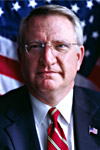Remember back in 2007 when Bush's drug czar John Walters announced that cocaine prices were spiking and proceeded to do a proud drug war victory dance in newspapers nationwide? It was the high-water mark of his tenure in terms of positive press for the national drug strategy he'd championed shamelessly since taking office in late 2001. If drug prices were increasing, his argument claimed, then our campaign to rid the nation of drugs must be on the right track and our arsenal of brutal drug war tactics was being vindicated for all to see.
 | |
I recommend reading Grim's account to understand how badly Walters manipulated the data to make his case, but what I find most troubling in all of this is the role of the press in enabling such a transparent and self-serving deception. This is the story of a man who had already jettisoned all credibility through an endless series of similarly dubious pronouncements. ONDCP's bogus theatrics were sufficiently notorious by this point that even the conservative Washington Times balked at the opportunity to break the story of the Bush Administration's self-proclaimed surprise victory in the war on drugs.
It was Donna Leinwand at USA Today who gave Walters a podium from which to deceive the American public about the success of his policies. Drug policy was â and remains â Leinwand's beat at USA Today, thus she could easily have included a counterpoint in her coverage from one of the many experts that would gladly take her call. Instead, she uncritically passed along the claims of a notoriously deceitful propagandist to the American public, igniting a firestorm of press coverage that fraudulently propped up the drug czar's political agenda.
If there's a lesson to be learned from all this, it seems not to have sunk in yet. Only a month ago, Leinwand was still promoting misleading claims about the success of the war on cocaine. It is, of course, perfectly appropriate to quote the leaders of the worldwide war on drugs as they endeavor desperately and predictably to highlight any and all miniscule data points that favor their fixations. But that should only be half the story. If you base an entire news report on something a drug war cheerleader told you, then your story wonât be true and the public that relies upon you for drug policy news will end up understanding less about the issue than if they'd never read your article to begin with.
Ironically, widespread disgust with John Walters and the entrenched drug warrior mentality he represented has likely helped set the stage for the present political climate in which the drug policy debate has finally gone mainstream. The case for reform is at long last embraced and amplified by the same media that once ignored it at every turn. Prominent journalists themselves are speaking out and saying things that used to be off-limits.
Still, all those who rejoice at the impending collapse of the great drug war juggernaut should not lose sight of the fact that only 2 years ago, a single man was able to freeze time with a simple lie.
This work by StoptheDrugWar.org is licensed under Creative Commons Attribution-ShareAlike 4.0 International
Add new comment